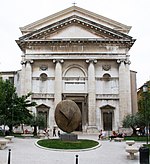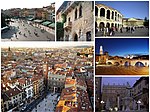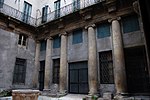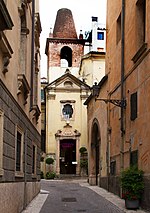Verona Arena
Buildings and structures in VeronaOpera houses in ItalyRoman amphitheatres in ItalyRoman sites of VenetoTourist attractions in Verona ... and 1 more
Venues of the 2026 Winter Olympics

The Verona Arena (Italian: Arena di Verona [aˈrɛːna di veˈroːna, aˈreːna -]) is a Roman amphitheatre in Piazza Bra in Verona, Italy built in 30 AD. It is still in use today and is internationally famous for the large-scale opera performances given there. It is one of the best preserved ancient structures of its kind. In ancient times, the arena's capacity was nearly 30,000 people. The stage for concerts and opera performances decreases the available places to a maximum of 22,000.
Excerpt from the Wikipedia article Verona Arena (License: CC BY-SA 3.0, Authors, Images).Verona Arena
Piazza Bra, Verona San Zeno
Geographical coordinates (GPS) Address Nearby Places Show on map
Geographical coordinates (GPS)
| Latitude | Longitude |
|---|---|
| N 45.438888888889 ° | E 10.994444444444 ° |
Address
Arena di Verona
Piazza Bra 1a
37121 Verona, San Zeno
Veneto, Italy
Open on Google Maps










